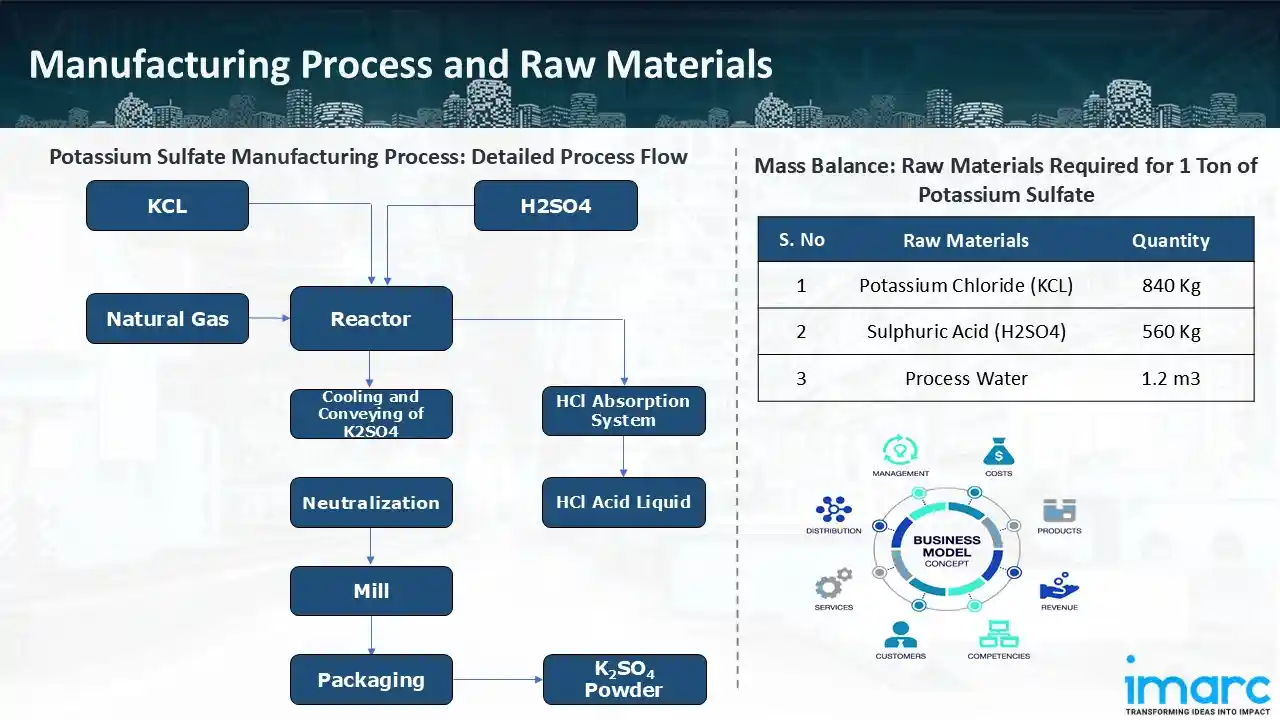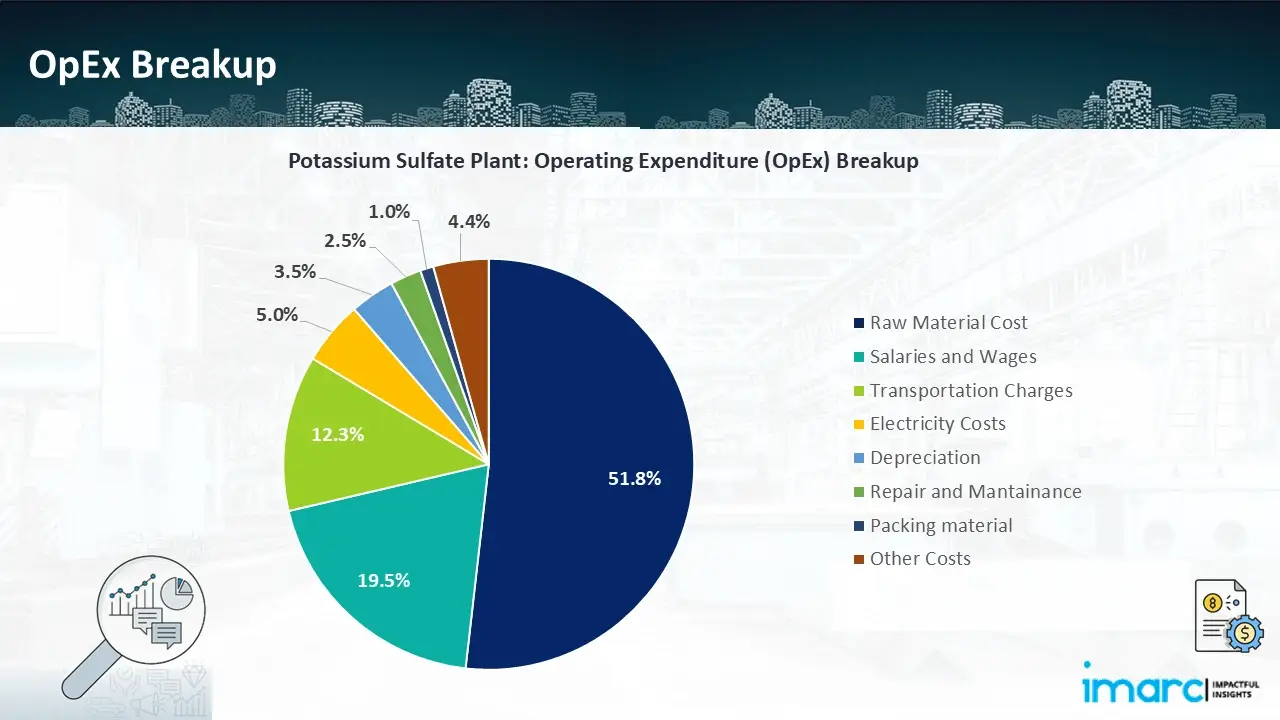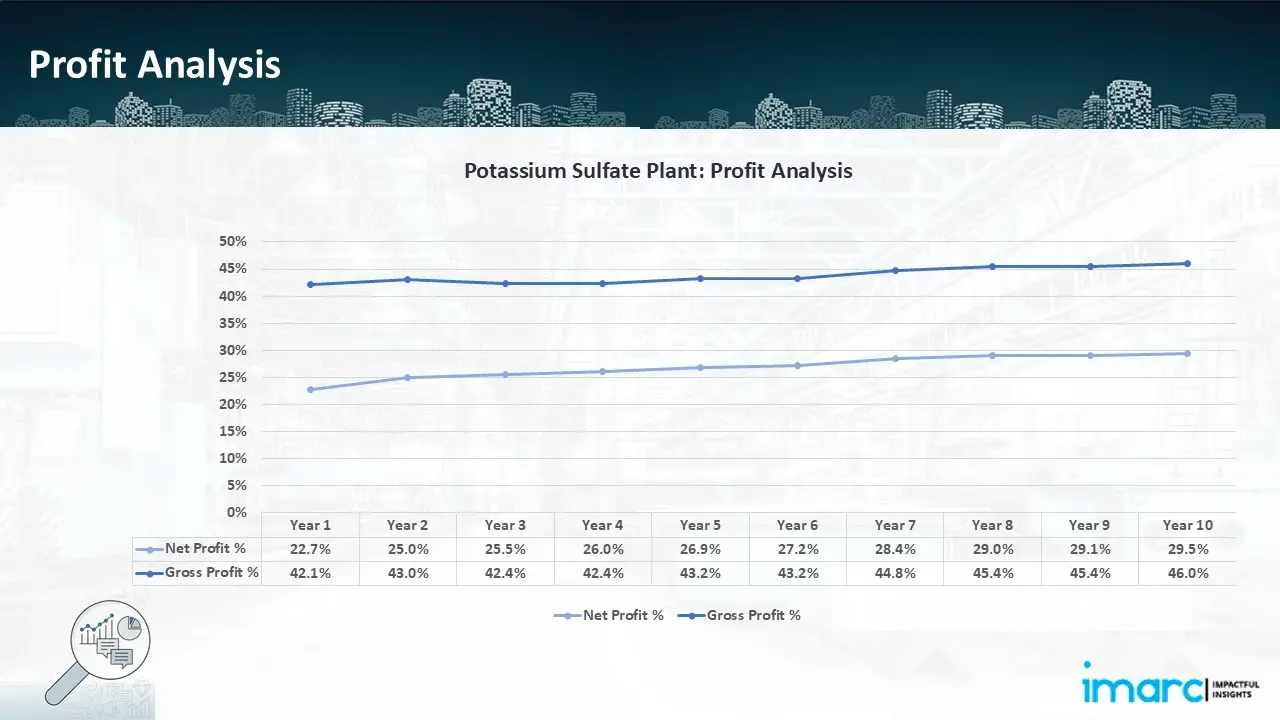Investment and Cost Structure of Potassium Sulfate Manufacturing Plant: A Cost Model Approach
_11zon.webp)
What is Potassium Sulfate?
Potassium sulfate (K2SO4) is an inorganic compound widely used as a specialty fertilizer, providing essential potassium and sulfur nutrients to crops. Its low salt index makes it the preferred crop for crops that are sensitive to chloride, like fruits, vegetables, and tobacco.
Key Applications Across Industries:
Potassium sulphate is also used in pharmaceutical and glass manufacturing processes, among other industrial processes. It is the perfect choice for contemporary agricultural methods because of its high solubility and compatibility with irrigation systems, which promote plant development, yield enhancement, and soil health maintenance.
What the Expert Says: Market Overview & Growth Drivers
According to an IMARC study, the global potassium sulfate market size reached US$ 3.92 Billion in 2024. Looking ahead, the market is expected to grow at a CAGR of approximately 5.7% from 2025 to 2033, reaching a projected size of US$ 6.41 Billion by 2033.
The rising need for fertilisers devoid of chloride, especially for high-value crops that are susceptible to chloride, such as tobacco, fruits, and vegetables, is driving the market for potassium sulphate. The demand for high-quality crop yields and rising worldwide agricultural productivity are driving its uptake. Potassium sulfate's high solubility and compatibility with irrigation systems provide additional support for market expansion, as does the increase in fertigation and precision farming techniques. Furthermore, potassium sulphate fertilisers are preferred over potassium chloride fertilisers due to the growing organic farming industry and strict environmental restrictions. The compound's industrial uses, such as in the production of glass and medications, increase demand for it. Other important growth causes include growing worries about food security and government programs encouraging balanced fertilisation. Additionally, rising potash mining operations and production process technological developments are improving supply stability, increasing potassium sulfate's affordability and accessibility in international markets.
Case Study on Cost Model of Potassium Sulfate Manufacturing Plant:
Objective
One of our clients has approached us to conduct a feasibility study for establishing a mid to large-scale potassium sulfate manufacturing plant in Azerbaijan.
IMARC Approach: Comprehensive Financial Feasibility
We have developed a detailed financial model for the plant's setup and operations. The proposed facility is designed with an annual production capacity of 10,000 tons of potassium sulfate.
Manufacturing Process: When potassium chloride (KCl) and sulphuric acid (H2SO4) mix in a reactor, potassium sulphate (K2SO4) is created. Natural gas serves as a heat source to enable this reaction, often referred to as the Mannheim process, to occur at high temperatures. An intermediate result of the chemical reaction is potassium bisulfate (KHSO4), which then combines with potassium chloride to produce potassium sulphate and hydrogen chloride (HCl) gas as a byproduct. To avoid clumping and guarantee a homogeneous crystalline structure, the generated potassium sulphate is then cooled and transported. The substance is then neutralised to eliminate any remaining acidity, guaranteeing that the finished product satisfies quality requirements. Following neutralisation, the potassium sulphate is ground into the appropriate particle size for use in industry or agriculture. The processed potassium sulphate is next prepared for distribution to a variety of industries, mainly fertilisers, by being packed in bulk containers or moisture-resistant bags.

Get a Tailored Feasibility Report for Your Project Request Sample
Mass Balance and Raw Material Required: The primary raw materials utilized in the potassium sulfate manufacturing plant include potassium chloride, sulphuric acid and process water. To produce 1 ton of potassium sulfate, we require 840 kg of potassium chloride, 560 kg of sulphuric acid, and 1.2 m3 of process water.
List of Machinery:
The following equipment was required for the proposed plant:
- Reaction furnace
- Steel structure of furnace
- Reducer (including electrical machine)
- Storage tank of H2SO4 (150m³)
- H2SO4 Acid pump
- KCL Bucket conveyor
- KCL Scraper conveyor (1.5T/H)
- Storage tank of KCl (Φ1600)
- KCl Helical conveyer (1.5kw)
- H2SO4l tank (Φ1000)
- Hydrogen chloride gas absorption device
- Hydrogen chloride gas treatment unit
- FRP chimney (300)
- HCl concentration meter
- FRP Fan cover (1960×1480×1380)
- Steel structure for acid making system
- Cooling propeller (1000×6195)
- Motor (7.5kw)
- Conveyor K2SO4 (219×2700)
- Motor (1.5kw)
- K2SO4 Scraper conveyor (1.5t/h)
- K2SO4 Bucket conveyor (1.5t/h)
- Dust removing fan
- Motor (7.5kw)
- Star-shaped distributor (TGFY2.8L Φ159 0.75kw)
- Dust collector (MC-72)
- Calcia helical conveyer (89×1400 0.75kw)
- Calcia feeder
- Crusher (ALD300)
- Screen (1.5T/H 3KW)
- K2SO4 Helical conveyer (D230×6600 2.2KW)
- Tank of finished K2SO4 (2600×4700)
- Hot water collector (800×1100×900)
- Water distributor (DN300×1250)
- Water circulation tank
- Recycle water pump (IS100-80-160 15kw)
- Concrete basin
- Cooling tower (ALD-200)
- Motor (7.5kw)
- Cooling tower pump (IS100-80-125 11KW)
- Graphite Cooler (ALD-50)
- Burner (GLQZ-I)
- Air blower (9-19 11kw)
Techno-Commercial Parameter:
- Capital Investment (CapEx): Capital expenditure (CapEx) in a manufacturing plant includes various investments essential for its setup and long-term operations. It covers machinery and equipment costs, including procurement, installation, and commissioning. Civil works expenses involve land development, factory construction, and infrastructure setup. Utilities such as power, water supply, and HVAC systems are also significant. Additionally, material handling systems, automation, environmental compliance, and safety measures are key components. Other expenditures include IT infrastructure, security systems, and office essentials, ensuring operational efficiency and business growth.
- Operating Expenditure (OpEx): Operating expenditure is the cost incurred to operate a manufacturing plant effectively. Opex in a manufacturing plant typically includes the cost of raw materials, utilities, depreciation, taxes, packing cost, transportation cost, and repairs and maintenance. The operating expenses are part of the cost structure of a manufacturing plant and have a significant effect on profitability and efficiency. Effective control of these costs is necessary for maintaining competitiveness and growth.

- Profitability Analysis Year on Year Basis: The proposed potassium sulfate plant, with a capacity of 10,000 tons of potassium sulfate annually, achieved an impressive revenue of USD 6.9 million in its first year. We assisted our client in developing a detailed cost model, which projects steady growth, with revenue rising throughout the projected period. Gross profit margins improved from 42.1% to 46.0% during the period, and net profit margins rise from 22.7% to 29.5%, highlighting strong financial viability and operational efficiency.

Conclusion & IMARC's Impact:
Our potassium sulfate manufacturing plant's financial model was meticulously modelled to satisfy the client's requirements. It provided a thorough analysis of production costs including capital expenditures, manufacturing processes, raw materials, and operating costs. The model predicts profitability while accounting for market trends, inflation, and any shifts in the price of raw materials. It was created especially to satisfy the demand of producing 10,000 tons of potassium sulfate annually. Our commitment to offering precise, client-cantered solutions that ensure the long-term success of significant industrial projects by giving the client useful data for strategic decision-making is demonstrated by this comprehensive financial model.
Latest News and Developments:
- In September 2024, Cinis Fertiliser is getting ready to send its first shipment of sulphate of potash (SOP) to a distributor, which will be a significant moment in the company's history. This shipment demonstrates the company's advancements in producing sustainable fertiliser, since SOP is an essential ingredient for crops with high value.
- In July 2024, in Western Australia, SO4, a division of Seven Global Investments, has effectively generated its first organic sulphate of potash (SOP) at its Lake Way plant. Its position in the sustainable agricultural industry is strengthened by this accomplishment, which meets the rising demand for premium fertilisers based on potassium.
- In July 2022, Tessenderlo Group, a chemical firm established in Belgium, combined with Picanol Group to create a single industrial powerhouse. This calculated action was intended to improve their standing in the potassium sulphate market by increasing transparency and streamlining the group structure.
- In June 2022, K+S and Cinis Fertilizer, a Swedish company, signed a letter of intent to investigate potential future collaboration in the synthetic synthesis of potassium sulfate. In order to improve production capacity and satisfy rising market demand, K+S plans to provide Cinis Fertiliser with all of its potassium chloride needs under the proposed deal.
Why Choose IMARC:
IMARC's Financial Model Expertise: Helping Our Clients Explore Industry Economics
IMARC is a global market research company that offers a wide range of services, including market entry and expansion, market entry and opportunity assessment, competitive intelligence and benchmarking, procurement research, pricing and cost research, regulatory approvals and licensing, factory setup, factory auditing, company incorporation, incubation services, recruitment services, and marketing and sales.
Brief List of Our Services: Market Entry and Expansion
- Market Entry and Opportunity Assessment
- Competitive Intelligence and Benchmarking
- Procurement Research
- Pricing and Cost Research
- Sourcing
- Distribution Partner Identification
- Contract Manufacturer Identification
- Regulatory Approvals, and Licensing
- Factory Setup
- Factory Auditing
- Company Incorporation
- Incubation Services
- Recruitment Services
- Marketing and Sales
Under our factory setup services, we assist our clients in exploring the feasibility of their plants by providing comprehensive financial modeling. Additionally, we offer end-to-end consultation for setting up a plant in India or abroad. Our financial modeling includes an analysis of capital expenditure (CapEx) required to establish the manufacturing facility, covering costs such as land acquisition, building infrastructure, purchasing high-tech production equipment, and installation. Furthermore, the layout and design of the factory significantly influence operational efficiency, energy consumption, and labor productivity, all of which impact long-term operational expenditure (OpEx). So, every parameter is covered in the analysis.
At IMARC, we leverage our comprehensive market research expertise to support companies in every aspect of their business journey, from market entry and expansion to operational efficiency and innovation. By integrating our factory setup services with our deep knowledge of industry dynamics, we empower our clients to not only establish manufacturing facilities but also strategically position themselves in highly competitive markets. Our financial modeling and end-to-end consultation services ensure that clients can explore the feasibility of their plant setups while also gaining insights into competitors' strategies, technological advancements, and regulatory landscapes. This holistic approach enables our clients to make informed decisions, optimize their operations, and align with sustainable practices, ultimately driving long-term success and growth.
Our Clients
Contact Us
Have a question or need assistance?
Please complete the form with your inquiry or reach out to us at
Phone Number
+91-120-433-0800+1-201-971-6302
+44-753-714-6104











